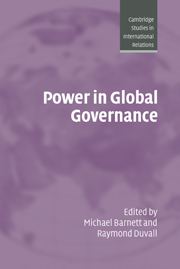Book contents
- Frontmatter
- Contents
- Notes on the contributors
- Acknowledgements
- 1 Power in global governance
- 2 Power, institutions, and the production of inequality
- 3 Policing and global governance
- 4 Power, fairness, and the global economy
- 5 Power politics and the institutionalization of international relations
- 6 Power, governance, and the WTO: a comparative institutional approach
- 7 The power of liberal international organizations
- 8 The power of interpretive communities
- 9 Class powers and the politics of global governance
- 10 Global civil society and global governmentality: or, the search for politics and the state amidst the capillaries of social power
- 11 Securing the civilian: sex and gender in the laws of war
- 12 Colonial and postcolonial global governance
- 13 Knowledge in power: the epistemic construction of global governance
- References
- Index
- CAMBRIDGE STUDIES IN INTERNATIONAL RELATIONS: 98
7 - The power of liberal international organizations
Published online by Cambridge University Press: 22 September 2009
- Frontmatter
- Contents
- Notes on the contributors
- Acknowledgements
- 1 Power in global governance
- 2 Power, institutions, and the production of inequality
- 3 Policing and global governance
- 4 Power, fairness, and the global economy
- 5 Power politics and the institutionalization of international relations
- 6 Power, governance, and the WTO: a comparative institutional approach
- 7 The power of liberal international organizations
- 8 The power of interpretive communities
- 9 Class powers and the politics of global governance
- 10 Global civil society and global governmentality: or, the search for politics and the state amidst the capillaries of social power
- 11 Securing the civilian: sex and gender in the laws of war
- 12 Colonial and postcolonial global governance
- 13 Knowledge in power: the epistemic construction of global governance
- References
- Index
- CAMBRIDGE STUDIES IN INTERNATIONAL RELATIONS: 98
Summary
International organizations are at the hub of most theoretical and historical discussions of global governance. Politicians, publics, and theorists alike believe that a globalizing world requires mechanisms to manage the growing complexity of crossnational interactions, and international organizations are the mechanism of choice. As a result of this vision, states have established more and more international organizations (IOs) to perform an increasingly varied array of tasks. IOs now manage conflicts, both international and civil. They promote economic growth and free trade, they work to avert environmental disasters, and they are actively involved in protecting human rights around the globe.
The reasons states turn to IOs and delegate critical tasks to them are not mysterious or controversial in most of the scholarly literature. The conventional wisdom is that states create and delegate to IOs because they provide essential functions. They provide public goods, collect information, establish credible commitments, monitor agreements, and generally help states overcome problems associated with collective action and enhance individual and collective welfare. This perspective generates important insights, but the statism and functionalism of this view also obscures important features of IOs, making it difficult to see the power they exercise in global governance. First, the functionalist treatment of IOs reduces them to technical accomplishments, slighting their political character and the political work they do. It also presumes that the only interesting or important functions that IOs might perform are those that facilitate cooperation and resolve problems of interdependent choice. However, IOs do much more.
- Type
- Chapter
- Information
- Power in Global Governance , pp. 161 - 184Publisher: Cambridge University PressPrint publication year: 2004
- 33
- Cited by



